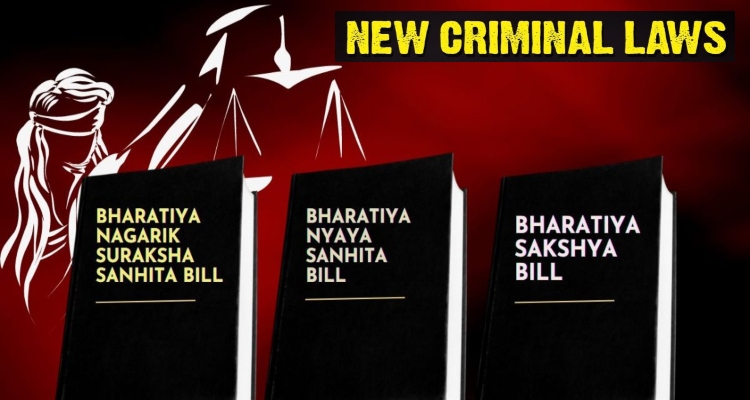
The three new criminal laws will be implemented on Monday nationwide, bringing significant reforms to India’s criminal justice system and replacing colonial-era legislation.
Laws Replacements…
The Bharatiya Nyaya Sanhita, Bharatiya Nagarik Suraksha Sanhita, and Bharatiya Sakshya Adhiniyam will replace the British-era Indian Penal Code, Code of Criminal Procedure, and Indian Evidence Act, respectively. These new laws aim to modernize the justice system, including provisions like Zero FIR, online police complaint registration, electronic summons via SMS, and mandatory videography of crime scenes for severe crimes.
Official sources stated that, the new laws address current social realities and crimes while aligning with the ideals enshrined in the Constitution. Union Home Minister Amit Shah, who introduced the laws, emphasized that they prioritize justice over penal action, a departure from British-era laws. “These laws are made by Indians, for Indians, and by an Indian Parliament, marking the end of colonial criminal justice laws,” he said, highlighting that the overhaul is not just a name change but a complete transformation.
Under the new laws, criminal case judgments must be delivered within 45 days of trial completion, and charges must be framed within 60 days of the first hearing. Statements from rape victims will be recorded by a female police officer in the presence of a guardian or relative, and medical reports must be completed within seven days. The laws define organized crimes and terrorism, replace sedition with treason, and mandate video recording of all searches and seizures.
New Laws With New Chapters
A new chapter on crimes against women and children has been added, making the buying and selling of any child a heinous crime, with provisions for the death sentence or life imprisonment for gang rape of a minor. Offenses against women and children, murder, and offenses against the State are prioritized in the new law.
Overlapping sections have been merged and simplified, reducing the Indian Penal Code from 511 to 358 sections. Definitions previously scattered across sections have been consolidated, and outdated sections have been repealed or moved under other relevant laws.
The Bharatiya Nyaya Sanhita addresses specific crimes such as false promises of marriage, gang rape of minors, mob lynching, and chain snatching, which were not adequately covered by the Indian Penal Code. New provisions have been introduced for cases like the abandonment of women after false promises of marriage. The laws are based on justice, transparency, and fairness.
Electronic communication now allows incident reporting without visiting a police station, facilitating quicker action by the police. Zero FIR enables filing a First Information Report at any police station, regardless of jurisdiction, ensuring immediate legal proceedings.
An interesting addition is the right of arrested individuals to inform a person of their choice about their situation, ensuring immediate support. Arrest details will be prominently displayed in police stations and district headquarters for easy access by families and friends. Forensic experts must now visit crime scenes for serious offenses to collect evidence.
Victims of crimes against women are entitled to regular updates on their case progress within 90 days, enhancing transparency and trust. The new laws guarantee free first-aid or medical treatment to victims of crimes against women and children at all hospitals, ensuring immediate access to essential care. Summonses can be served electronically, expediting legal processes, reducing paperwork, and ensuring efficient communication among all parties involved.




